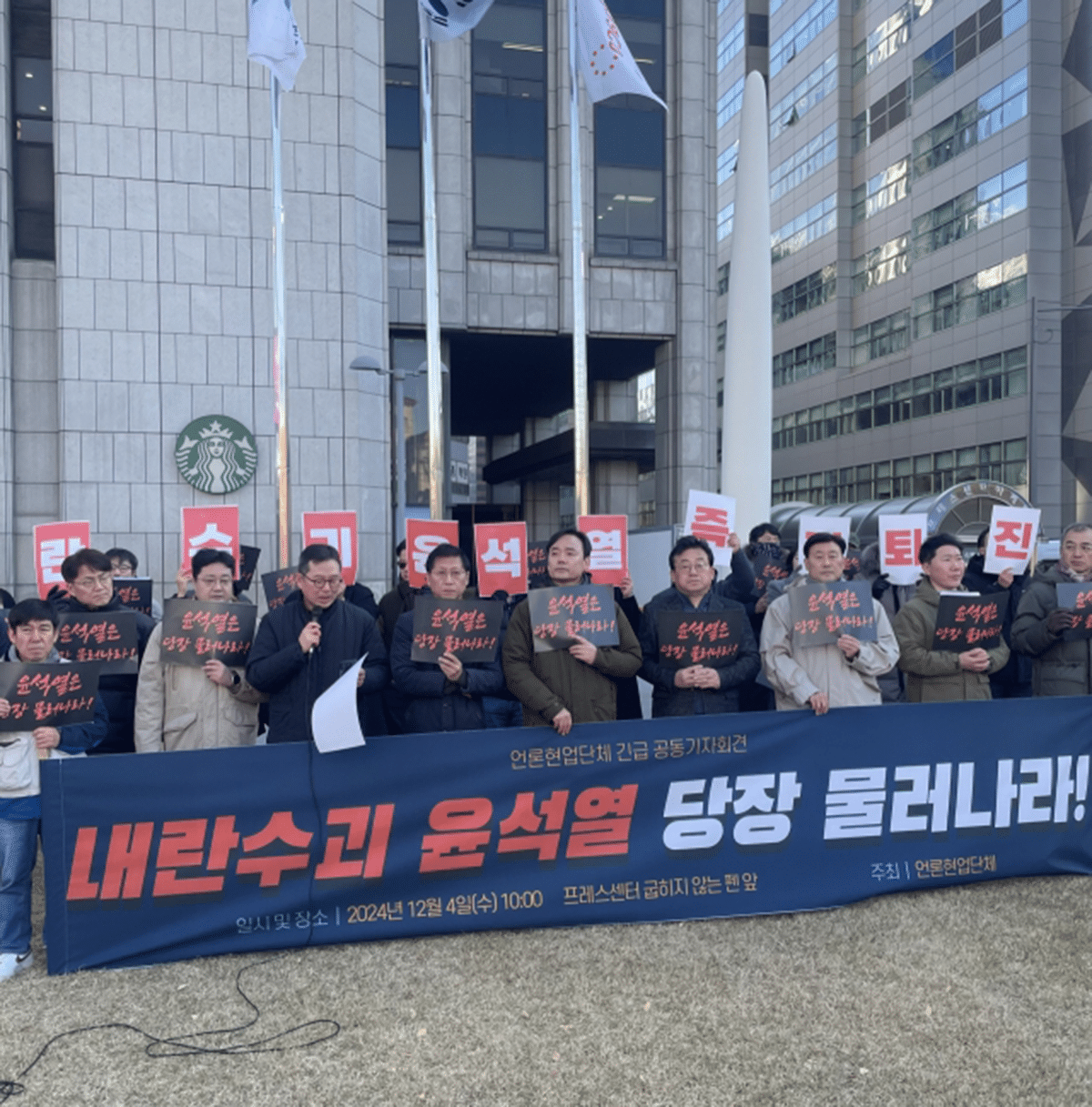South Korean media call for Yoon Suk Yeol’s resignation, arrest

Media representatives gather outside the Korea Press Center in central Seoul on Wednesday morning to condemn President Yoon’s declaration of martial law last night. (Moon Ki-hoon/The Korea Herald)
SEOUL — “This is no mere criticism — we’re waging war against President Yoon Suk Yeol.”
These words rang out outside the Korea Press Center in central Seoul Wednesday morning, where media representatives had gathered to condemn Yoon’s overnight attempt to place press operations under military control as part of his extraordinary emergency martial law decree. The press conference reaffirmed the media’s unequivocal opposition to the martial law decree that, though short-lived, brought sudden chaos and threw South Korea’s democratic principles into question.
Dozens of journalists and officials from an alliance of eight major news media organizations assembled for an emergency press conference, delivering a series of strongly worded statements demanding Yoon’s immediate resignation and arrest.
READ: What next for South Korea’s Yoon after failed martial law attempt?
Yoon’s martial law decree, issued Tuesday at 10:23 p.m. and rescinded at 4:26 a.m. after the National Assembly voted to revoke it, imposed sweeping restrictions on civil liberties. Most alarming to press freedom advocates were provisions placing all media under direct military control and banning activities deemed as “manipulation of public opinion.”
The decree’s second and third provisions placed all media under martial law control, banning activities deemed as “manipulation of public opinion” — effectively putting all press operations under direct military command.
However, South Korean journalists immediately stood defiant. Within hours, an alliance of eight major media organizations, including press unions and journalist associations, issued a scathing joint statement demanding Yoon’s resignation.
The morning press conference doubled down on that earlier joint statement issued at 12:40 a.m. Wednesday, which had branded the martial law “a gross assault on the country’s hard-earned democratic achievements” and “a declaration of war against critical media and the public at large.”
READ: What unfolded on Tuesday night in Seoul: A timeline
The organizations specifically condemned the decree’s media restrictions. “This anachronistic, unconstitutional attempt to ban political assembly and control media shows the Yoon government has deviated into a full-blown dictatorship,” they stated.
“We never imagined the specter of martial law and dictatorship would return at the hands of our commander in chief,” said Jeon Dae-sik, vice chair of the National Union of Media Workers, which represents 15,000 members in the news industry. Speaking after several other media officials delivered remarks, Jeon read a collective statement demanding that “President Yoon step down and face punishment for his unconstitutional declaration of martial law that threatened democracy and press freedom.”
For South Korean journalists, the decree evoked dark memories of press suppression under former President Chun Doo-hwan’s 1980 martial law declaration, which preceded the violent crackdown on protesters in Gwangju. Court documents from Chun’s 1997 trial revealed his regime’s systematic control: Military officials occupied newsrooms, journalists were blacklisted and media outlets were forced to merge.
The 1997 trials of Chun and top officials specifically cited these media crackdowns as examples of “subverting the Constitution” — establishing a legal precedent that using martial law to control media constitutes insurrection.
Press unites in condemnation
Yoon’s withdrawal of martial law was broadcast live at 4:26 a.m. Wednesday, too late to be reflected in the editorials of most morning papers. In a rare show of unity across South Korea’s typically polarized media landscape, both progressive and conservative outlets uniformly condemned Yoon’s action.
The left-leaning Hankyoreh ran a front-page editorial titled “Yoon’s Martial Rule is Treason Against the People,” warning that confrontation with civilians would “invite historical punishment.” Kyunghyang Sinmun and Hankook Ilbo struck similar tones, emphasizing the decree’s unconstitutionality.
Conservative outlets offered no defense. The center-right JoongAng Ilbo expressed shock, observing that “Yoon may have gone down an irrevocable path.” Its editorial drew explicit parallels to the Chun era, noting that using military force to resolve political disputes “invokes the nightmare” of those dark days. Dong-A Ilbo characterized the move as “turning back the clock on 40 years of Korea’s democratic accomplishment.”
Even Chosun Ilbo, the country’s leading conservative outlet, usually sympathetic to Yoon, called the move “political self-harm” on its front page, warning it would spark renewed impeachment efforts from the opposition. In an analysis piece, the paper questioned the martial law decree’s legitimacy, citing sources that noted “due process stipulated by the constitution seems to have not been followed,” and concluding “it is difficult to say the martial law is legitimate.”
Yet Chosun Ilbo’s editorial struck a markedly different tone from other major outlets. While calling Yoon’s announcement “unwarranted” and “mind-boggling,” it devoted substantial space to explaining Yoon’s rationale. The paper echoed claims from Yoon’s televised martial law declaration that the Democratic Party of Korea’s impeachment efforts were “paralyzing administrative power,” suggesting the president “could have felt aggrieved,” though he clearly overstepped the bounds of his authority by declaring martial law.